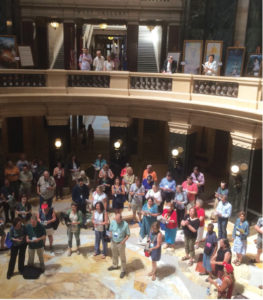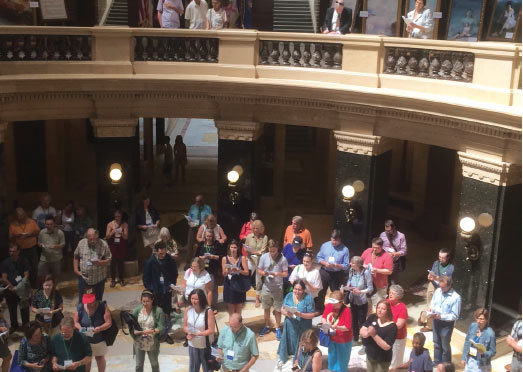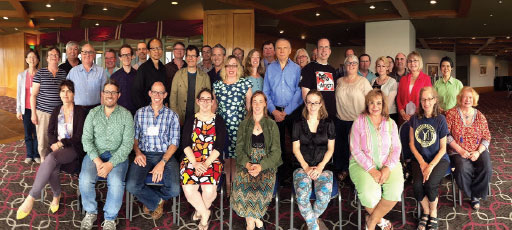by Karen Sandene, ROPA Secretary and Member of Locals 463 (Lincoln, NE) and 70-558 (Omaha, NE)
The 31st annual Regional Orchestra Players Association (ROPA) Conference convened this past July in Madison, Wisconsin, at the Pyle Center on the University of Wisconsin campus. The conference provided a terrific learning opportunity for the representatives of our 87 orchestras from around the nation. It was also a chance to offer our best wishes to three of our colleagues as they move on to new chapters in their lives.
Throughout the conference, representatives of the Symphonic Services Division (SSD) provided a wealth of knowledge. As well as being available for valuable one-on-one contact with delegates and speaking on several topics, SSD staff provided several hours of training to delegates from negotiating orchestras prior to the full conference. We thank SSD Director Jay Blumenthal; Director of Symphonic Electronic Media Debbie Newmark; Negotiators Nathan Kahn, Chris Durham, and Todd Jelen; Counsel Rochelle Skolnick; and Contract Administrator Laurence Hofmann for sharing their knowledge with the delegates.
In addition, ROPA utilized resources from the University of Wisconsin School for Workers, with Don Taylor leading the department and presenters Armando Iberra, Michael Childers, and David Nack. Sessions included “Building Community Support” and “How to Jumpstart Your Union.”

ROPA Delegates join the daily Solidarity Sing-Along at the Wisconsin State Capitol Building. The singalong has happened each weekday since March 2011.
The opening session began with a welcome by AFM Local 166 (Madison, WI) President Brian Witty. Wisconsin Public Radio Producer Norman Gilliland spoke about how culture can bring together people with diverse political viewpoints. Wisconsin Chamber Orchestra Executive Director Mark Cantrell spoke about the importance of educating the board. In a presentation titled “Lessons Learned: Hartford Symphony/Grand Rapids Symphony,” Nathan Kahn, Randy Whatley, Paul Austin, and Steve Wade discussed the outcomes of those negotiations as a result of social media, networking, and public relations activities. Following the morning sessions, the delegation headed to the Wisconsin State Capitol Building to participate in the daily Solidarity Sing-Along, which has been a fixture at the capitol since March 2011.
Delegates spent time the first day in small group discussions with their members-at-large. Afternoon presentations included conductor survey procedures; breakout sessions dealing with grievances, public relations, and committee basics; as well as new delegate orientation.
The second day was a busy one. AFM President Ray Hair addressed the conference, discussing highlights of the AFM Convention, the Democratic National Convention, and local officer training. Federal Mediation and Conciliation Service Director Allison Beck spoke in detail about the “gig economy” and the effect it has on the labor industry. Americans for the Arts Vice President of Research & Policy Randy Cohen presented the results of several surveys about the impact of arts on individuals and communities. Representatives from the Organization of Canadian Symphony Musicians (OCSM), the Theater Musicians Association (TMA), and the International Conferences of Symphony and Opera Musicians (ICSOM) gave updates from their conferences.
Following the day’s sessions, attendees had the opportunity to go to a concert on the lawn of the State Capitol where the Wisconsin Chamber Orchestra performed.
The final day of the conference began with presentations by the Symphonic Services Division. Laurence Hofmann introduced features of the new electronic wage chart. Nathan Kahn spoke of the early days of his orchestral experiences and how it led to the creation of ROPA. Rochelle Skolnick led a role-playing activity on peer review. Our final speaker was Interfaith Coalition for Worker Justice Executive Director Rabbi Renee Bauer. She described how to build alliances between community organizations and labor.
The conference extended warm wishes to our friends AFM Negotiator Nathan Kahn, ICSOM Chair Bruce Ridge, and ROPA President Carla Lehmeier-Tatum as they step down from their positions. Their service to our orchestras and the AFM has been invaluable. Assuming the role of ROPA President is John Michael Smith, of the Minnesota Opera Orchestra and Local 30-73 (Minneapolis-St. Paul, MN). Along with Smith, the 2016-17 ROPA Executive Board that was elected on the final day of conference includes Vice President Nancy Nelson of 65-699 (Houston, TX), Secretary Karen Sandene, Treasurer Donna Loomis of Local 466 (El Paso, TX), Delegate-at-Large to the AFM Convention Naomi Bensdorf Frisch of Local 10-208 (Chicago, IL), and Members-at-Large Taylor Brown of Local 80 (Chattanooga, TN), Lisa Davis of Local 579 (Jackson, MS), Sean Diller of Local 232-278 (South Bend, IN), Mary Anne Lemoine of Local 154 (Colorado Springs, CO), Dave Shelton of Local 554-635 (Lexington, KY), Maya Stone of Locals 80 and 257 (Nashville, TN), and Steve Wade of Local 400 (Hartford-New Haven, CT).
And finally, we offer our sincere appreciation to conference hosts, the musicians of the Madison Symphony and Wisconsin Chamber Orchestra, Local 166 (Madison, WI), Madison Local President Brian Witty, and numerous hard-working local volunteers. We would also like to thank Conference Coordinator Linda Boivin of Local 618 (Albuquerque, NM) and ROPA Board Member-at-Large Naomi Bensdorf Frisch for their outstanding work assisting the ROPA Board in presenting a well-run conference. We look forward to our 32nd Annual Conference in 2017 in Phoenix, Arizona.




